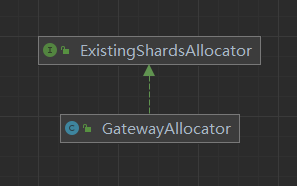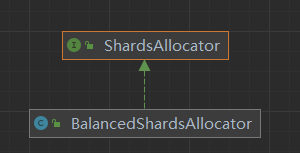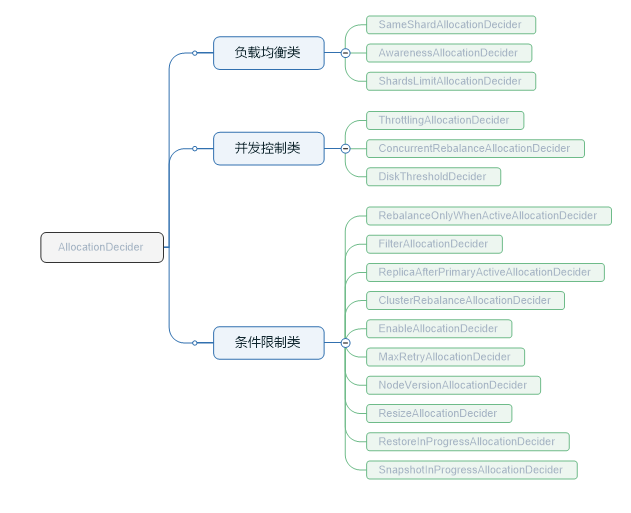1、简介
分配服务主要是作分片的分配,决定哪些分片应该在哪个节点上,以及哪个为主分片,哪个为副分片 。对于新建索引和已有索引,分片分配过程不相同。
2、基础
包含ShardsAllocator,ExistingShardsAllocator和AllocationDecider
2.1 allocators
2.1.1 ExistingShardsAllocator
接口方法有
| 方法 | 说明 |
| beforeAllocation | 分配前操作 |
| afterPrimariesBeforeReplicas | 主分片分配后,副分片分配之前 |
| allocateUnassigned | 分配未赋值的分片 |
| explainUnassignedShardAllocation | 解释未赋值分片分配 |
| cleanCaches | 当节点成为主节点或者主节点变为其他时调用 |
| applyStartedShards | 应用启动的分片 |
| applyFailedShards | 应用失败的分片 |
| getNumberOfInFlightFetches | 获取in-flight获取的数目 |
其实现类有
2.1.2 ShardsAllocator
分片分配器接口,方法有
| 方法 | 说明 |
| allocate | 分配分片到集群中的一个节点 |
| decideShardAllocation | 分片分配到集群中的决策 |
实现类有
2.1.3 AllocationDecider
分片决策,方法有
| 方法 | 说明 |
| canRebalance | 判断分片路由是否可以平衡 |
| canAllocate | 判断分片路由是否可以分配在指定节点 |
| canRemain | 判断分片路由是否可以保留在指定节点 |
| shouldAutoExpandToNode | 判断索引分片是否应该自动扩展到节点 |
| canForceAllocatePrimary | 判断指定的主分片是否强制分配到指定节点 |
有以下几类决策
2.2 分配时机
以下情况会触发AllocationService#reroute重新分配
- 节点增加或者删除
- 重启恢复
- 恢复快照
- 索引元数据创建、删除、关闭、打开、更新配置
- 集群配置更新
- 执行reroute命令
- 网关恢复
| 类 | 方法 |
| TransportClusterUpdateSettingsAction | masterOperation |
| MetadataCreateIndexService | applyCreateIndexWithTemporaryService |
| MetadataDeleteIndexService | deleteIndices |
| MetadataIndexStateService | closeIndices,onlyOpenIndex |
| MetadataUpdateSettingsService | updateSettings |
| DelayedAllocationService.DelayedRerouteTask | execute |
| AllocationService | disassociateDeadNodes |
| GatewayService.RecoverStateUpdateTask | execute |
| LocalAllocateDangledIndices.AllocateDangledRequestHandler | messageReceived |
| Node | 构造函数中创建RerouteService |
| RestoreService | restoreSnapshot |
3、reroute
3.1 基础分析
reroute中主要实现两种分配
- gatewayAllocator,分配已存在的分片,从磁盘中找到它们
- shardsAllocator, 用于平衡分片在节点中的分布。
private void reroute(RoutingAllocation allocation) {
removeDelayMarkers(allocation);
allocateExistingUnassignedShards(allocation); // try to allocate existing shard copies first
shardsAllocator.allocate(allocation);
}reroute主要运行于MasterService.UpdateTask线程中
3.2 集群启动时gateway触发
创建GatewayService时,如果discovery为Coordinator时,会创建恢复的任务。
if (discovery instanceof Coordinator) {
recoveryRunnable = () ->
clusterService.submitStateUpdateTask("local-gateway-elected-state", new RecoverStateUpdateTask());
} 在两阶段提交的commit阶段时,会执行ClusterStateListener#clusterChanged,调用performStateRecovery
private void performStateRecovery(final boolean enforceRecoverAfterTime, final String reason) {
if (enforceRecoverAfterTime && recoverAfterTime != null) {
if (scheduledRecovery.compareAndSet(false, true)) {
logger.info("delaying initial state recovery for [{}]. {}", recoverAfterTime, reason);
threadPool.schedule(new AbstractRunnable() {
@Override
public void onFailure(Exception e) {
logger.warn("delayed state recovery failed", e);
resetRecoveredFlags();
}
@Override
protected void doRun() {
if (recoveryInProgress.compareAndSet(false, true)) {
logger.info("recover_after_time [{}] elapsed. performing state recovery...", recoverAfterTime);
recoveryRunnable.run();
}
}
}, recoverAfterTime, ThreadPool.Names.GENERIC);
}
} else {
if (recoveryInProgress.compareAndSet(false, true)) {
threadPool.generic().execute(new AbstractRunnable() {
@Override
public void onFailure(final Exception e) {
logger.warn("state recovery failed", e);
resetRecoveredFlags();
}
@Override
protected void doRun() {
logger.debug("performing state recovery...");
recoveryRunnable.run();
}
});
}
}
}3.3 gatewayAllocator
包含主分片器和副分片分配器PrimaryShardAllocator和ReplicaShardAllocator,都继承BaseGatewayShardAllocator
3.3.1 allocateExistingUnassignedShards
- 遍历存在的分片分配器,执行beforeAllocation
- 遍历未分配主分片,执行allocateUnassigned
- 遍历存在的分片分配器,执行afterPrimariesBeforeReplicas
- 遍历未分配副分片,执行allocateUnassigned
3.3.2 PrimaryShardAllocator
allocateUnassigned是调用父类BaseGatewayShardAllocator的,其作分配决策是调用 PrimaryShardAllocator中的makeAllocationDecision。
如果未分配分片的恢复源类型为SNAPSHOT并且路由分配allocation的snapshotShardSizeInfo的分片大小没有设置,则通过决策器来决定是否分配。否则发起向所有数据节点获取某个shard元信息的fetchData请求。
AsyncShardFetch方法有
| 方法 | 说明 |
| fetchData | 向所有节点获取某个shard元信息 |
| asyncFetch | 异步获取集群中指定分片的元数据 |
| reroute | 抽象方法,实现此用于调度另一轮产生调用获取数据 |
其类层次关系有
InternalAsyncFetch泛化AsyncShardFetch,其实现了reroute方法,调用BatchedRerouteService#reroute
AsyncShardFetch的成员包含Lister接口,InternalPrimaryShardAllocator对应使用的是listStartedShards方法,用来发送TransportNodesListGatewayStartedShards.TYPE请求,请求节点shard元信息的action为internal:gateway/local/started_shards,发送的过程主要实现为AsyncAction#start
void start() {
final DiscoveryNode[] nodes = request.concreteNodes();
if (nodes.length == 0) {
// nothing to notify, so respond immediately, but always fork even if finalExecutor == SAME
final String executor = finalExecutor.equals(ThreadPool.Names.SAME) ? ThreadPool.Names.GENERIC : finalExecutor;
threadPool.executor(executor).execute(() -> newResponse(task, request, responses, listener));
return;
}
final TransportRequestOptions transportRequestOptions = TransportRequestOptions.timeout(request.timeout());
for (int i = 0; i < nodes.length; i++) {
final int idx = i;
final DiscoveryNode node = nodes[i];
final String nodeId = node.getId();
try {
TransportRequest nodeRequest = newNodeRequest(request);
if (task != null) {
nodeRequest.setParentTask(clusterService.localNode().getId(), task.getId());
}
transportService.sendRequest(node, getTransportNodeAction(node), nodeRequest, transportRequestOptions,
new TransportResponseHandler<NodeResponse>() {
@Override
public NodeResponse read(StreamInput in) throws IOException {
return newNodeResponse(in);
}
@Override
public void handleResponse(NodeResponse response) {
onOperation(idx, response);
}
@Override
public void handleException(TransportException exp) {
onFailure(idx, node.getId(), exp);
}
});
} catch (Exception e) {
onFailure(idx, nodeId, e);
}
}
}接收端处理主要是NodeTransportHandler,其调用nodeOperation处理
class NodeTransportHandler implements TransportRequestHandler<NodeRequest> {
@Override
public void messageReceived(NodeRequest request, TransportChannel channel, Task task) throws Exception {
channel.sendResponse(nodeOperation(request, task));
}
}请求端收到响应后处理逻辑为processAsyncFetch,收到各节点返回的shard级别元数据后,放到cache中,下次reroute从cache时取,然后再次执行reroute
protected synchronized void processAsyncFetch(List<T> responses, List<FailedNodeException> failures, long fetchingRound) {
if (closed) {
// we are closed, no need to process this async fetch at all
logger.trace("{} ignoring fetched [{}] results, already closed", shardId, type);
return;
}
logger.trace("{} processing fetched [{}] results", shardId, type);
if (responses != null) {
for (T response : responses) {
NodeEntry<T> nodeEntry = cache.get(response.getNode().getId());
if (nodeEntry != null) {
if (nodeEntry.getFetchingRound() != fetchingRound) {
assert nodeEntry.getFetchingRound() > fetchingRound : "node entries only replaced by newer rounds";
logger.trace("{} received response for [{}] from node {} for an older fetching round (expected: {} but was: {})",
shardId, nodeEntry.getNodeId(), type, nodeEntry.getFetchingRound(), fetchingRound);
} else if (nodeEntry.isFailed()) {
logger.trace("{} node {} has failed for [{}] (failure [{}])", shardId, nodeEntry.getNodeId(), type,
nodeEntry.getFailure());
} else {
// if the entry is there, for the right fetching round and not marked as failed already, process it
logger.trace("{} marking {} as done for [{}], result is [{}]", shardId, nodeEntry.getNodeId(), type, response);
nodeEntry.doneFetching(response);
}
}
}
}
if (failures != null) {
for (FailedNodeException failure : failures) {
logger.trace("{} processing failure {} for [{}]", shardId, failure, type);
NodeEntry<T> nodeEntry = cache.get(failure.nodeId());
if (nodeEntry != null) {
if (nodeEntry.getFetchingRound() != fetchingRound) {
assert nodeEntry.getFetchingRound() > fetchingRound : "node entries only replaced by newer rounds";
logger.trace("{} received failure for [{}] from node {} for an older fetching round (expected: {} but was: {})",
shardId, nodeEntry.getNodeId(), type, nodeEntry.getFetchingRound(), fetchingRound);
} else if (nodeEntry.isFailed() == false) {
// if the entry is there, for the right fetching round and not marked as failed already, process it
Throwable unwrappedCause = ExceptionsHelper.unwrapCause(failure.getCause());
// if the request got rejected or timed out, we need to try it again next time...
if (unwrappedCause instanceof EsRejectedExecutionException ||
unwrappedCause instanceof ReceiveTimeoutTransportException ||
unwrappedCause instanceof ElasticsearchTimeoutException) {
nodeEntry.restartFetching();
} else {
logger.warn(() -> new ParameterizedMessage("{}: failed to list shard for {} on node [{}]",
shardId, type, failure.nodeId()), failure);
nodeEntry.doneFetching(failure.getCause());
}
}
}
}
}
reroute(shardId, "post_response");
}获取到分片数据后,得到索引元数据的inSyncAllocationIds,通过buildNodeShardsResult构建节点分片结果
- 对于分片恢复源为SNAPSHOT,排序规则为顺序为,是否在inSyncAllocationIds->没有存储异常->主分片
- 对于非SNAPSHOT,排序规则顺序为,没有存储异常->主分片
protected static NodeShardsResult buildNodeShardsResult(ShardRouting shard, boolean matchAnyShard,
Set<String> ignoreNodes, Set<String> inSyncAllocationIds,
FetchResult<NodeGatewayStartedShards> shardState,
Logger logger) {
List<NodeGatewayStartedShards> nodeShardStates = new ArrayList<>();
int numberOfAllocationsFound = 0;
for (NodeGatewayStartedShards nodeShardState : shardState.getData().values()) {
DiscoveryNode node = nodeShardState.getNode();
String allocationId = nodeShardState.allocationId();
if (ignoreNodes.contains(node.getId())) {
continue;
}
if (nodeShardState.storeException() == null) {
if (allocationId == null) {
logger.trace("[{}] on node [{}] has no shard state information", shard, nodeShardState.getNode());
} else {
logger.trace("[{}] on node [{}] has allocation id [{}]", shard, nodeShardState.getNode(), allocationId);
}
} else {
final String finalAllocationId = allocationId;
if (nodeShardState.storeException() instanceof ShardLockObtainFailedException) {
logger.trace(() -> new ParameterizedMessage("[{}] on node [{}] has allocation id [{}] but the store can not be " +
"opened as it's locked, treating as valid shard", shard, nodeShardState.getNode(), finalAllocationId),
nodeShardState.storeException());
} else {
logger.trace(() -> new ParameterizedMessage("[{}] on node [{}] has allocation id [{}] but the store can not be " +
"opened, treating as no allocation id", shard, nodeShardState.getNode(), finalAllocationId),
nodeShardState.storeException());
allocationId = null;
}
}
if (allocationId != null) {
assert nodeShardState.storeException() == null ||
nodeShardState.storeException() instanceof ShardLockObtainFailedException :
"only allow store that can be opened or that throws a ShardLockObtainFailedException while being opened but got a " +
"store throwing " + nodeShardState.storeException();
numberOfAllocationsFound++;
if (matchAnyShard || inSyncAllocationIds.contains(nodeShardState.allocationId())) {
nodeShardStates.add(nodeShardState);
}
}
}
final Comparator<NodeGatewayStartedShards> comparator; // allocation preference
if (matchAnyShard) {
// prefer shards with matching allocation ids
Comparator<NodeGatewayStartedShards> matchingAllocationsFirst = Comparator.comparing(
(NodeGatewayStartedShards state) -> inSyncAllocationIds.contains(state.allocationId())).reversed();
comparator = matchingAllocationsFirst.thenComparing(NO_STORE_EXCEPTION_FIRST_COMPARATOR)
.thenComparing(PRIMARY_FIRST_COMPARATOR);
} else {
comparator = NO_STORE_EXCEPTION_FIRST_COMPARATOR.thenComparing(PRIMARY_FIRST_COMPARATOR);
}
nodeShardStates.sort(comparator);
if (logger.isTraceEnabled()) {
logger.trace("{} candidates for allocation: {}", shard, nodeShardStates.stream().map(s -> s.getNode().getName())
.collect(Collectors.joining(", ")));
}
return new NodeShardsResult(nodeShardStates, numberOfAllocationsFound);
}基于分片决策做分片分配,分成yes/no/throttle三组。
private static NodesToAllocate buildNodesToAllocate(RoutingAllocation allocation,
List<NodeGatewayStartedShards> nodeShardStates,
ShardRouting shardRouting,
boolean forceAllocate) {
List<DecidedNode> yesNodeShards = new ArrayList<>();
List<DecidedNode> throttledNodeShards = new ArrayList<>();
List<DecidedNode> noNodeShards = new ArrayList<>();
for (NodeGatewayStartedShards nodeShardState : nodeShardStates) {
RoutingNode node = allocation.routingNodes().node(nodeShardState.getNode().getId());
if (node == null) {
continue;
}
Decision decision = forceAllocate ? allocation.deciders().canForceAllocatePrimary(shardRouting, node, allocation) :
allocation.deciders().canAllocate(shardRouting, node, allocation);
DecidedNode decidedNode = new DecidedNode(nodeShardState, decision);
if (decision.type() == Type.THROTTLE) {
throttledNodeShards.add(decidedNode);
} else if (decision.type() == Type.NO) {
noNodeShards.add(decidedNode);
} else {
yesNodeShards.add(decidedNode);
}
}
return new NodesToAllocate(Collections.unmodifiableList(yesNodeShards), Collections.unmodifiableList(throttledNodeShards),
Collections.unmodifiableList(noNodeShards));
}3.3.3 ReplicaShardAllocator
与PrimaryShardAllocator在作分配决策时,有一些差异,在fetchData前判断是否可以在一个节点上分配canBeAllocatedToAtLeastOneNode
public static Tuple<Decision, Map<String, NodeAllocationResult>> canBeAllocatedToAtLeastOneNode(ShardRouting shard,
RoutingAllocation allocation) {
Decision madeDecision = Decision.NO;
final boolean explain = allocation.debugDecision();
Map<String, NodeAllocationResult> nodeDecisions = explain ? new HashMap<>() : null;
for (ObjectCursor<DiscoveryNode> cursor : allocation.nodes().getDataNodes().values()) {
RoutingNode node = allocation.routingNodes().node(cursor.value.getId());
if (node == null) {
continue;
}
// if we can't allocate it on a node, ignore it, for example, this handles
// cases for only allocating a replica after a primary
Decision decision = allocation.deciders().canAllocate(shard, node, allocation);
if (decision.type() == Decision.Type.YES && madeDecision.type() != Decision.Type.YES) {
if (explain) {
madeDecision = decision;
} else {
return Tuple.tuple(decision, null);
}
} else if (madeDecision.type() == Decision.Type.NO && decision.type() == Decision.Type.THROTTLE) {
madeDecision = decision;
}
if (explain) {
nodeDecisions.put(node.nodeId(), new NodeAllocationResult(node.node(), null, decision));
}
}
return Tuple.tuple(madeDecision, nodeDecisions);
}今天的文章es中的读流程_es可视化管理工具「建议收藏」分享到此就结束了,感谢您的阅读。
版权声明:本文内容由互联网用户自发贡献,该文观点仅代表作者本人。本站仅提供信息存储空间服务,不拥有所有权,不承担相关法律责任。如发现本站有涉嫌侵权/违法违规的内容, 请发送邮件至 举报,一经查实,本站将立刻删除。
如需转载请保留出处:https://bianchenghao.cn/87101.html





